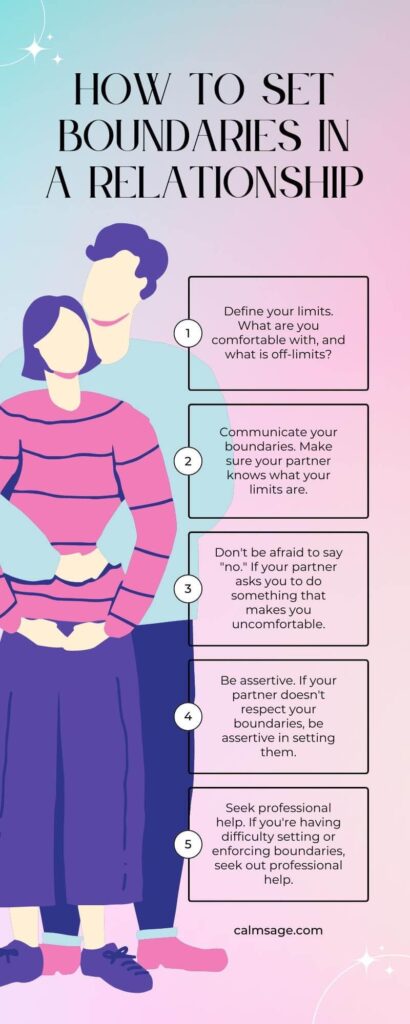In every meaningful relationship, boundaries aren’t barriers—they’re acts of love. Setting limits isn’t about keeping people out; it’s about protecting the sacred space where trust, respect, and understanding can grow. When we lovingly share our boundaries, we invite those we care about to truly see us, honoring our needs and feelings while strengthening the bond we hold dear. In a world where lines can easily blur, learning to express our limits with kindness becomes one of the most powerful gifts we can give—to ourselves and to those we love. Let’s explore how setting boundaries can deepen connection rather than drive distance, creating a foundation of heartfelt respect and genuine closeness.
Table of Contents
- Understanding Your Emotional Needs to Define Healthy Boundaries
- Communicating Boundaries with Compassion and Clarity
- Navigating Challenges When Boundaries Are Tested
- Celebrating Growth and Trust Through Mutual Respect
- Closing Remarks
Understanding Your Emotional Needs to Define Healthy Boundaries
Before we can lovingly express our limits to others, it’s essential to pause and tune in deeply to what our hearts and minds truly crave. Emotional needs often hide beneath layers of overlooked feelings and past experiences. To honor yourself, begin by identifying these core feelings with kindness and curiosity. Ask yourself: What makes me feel safe? When do I feel respected? Where do I notice tension in my connections that signals a boundary requiring attention? Recognizing these emotional currents gives clarity and power to your boundaries, transforming them from walls into bridges of understanding.
Some ways to uncover your emotional needs include:
- Journaling your daily emotional responses to different people and situations
- Reflecting on moments when you felt unheard, hurt, or overwhelmed
- Practicing mindfulness or meditation to tune into subtle feelings
- Seeking feedback from trusted friends or a therapist to identify blind spots
When you clearly grasp what nurtures your emotional well-being, setting boundaries becomes an act of self-love rather than confrontation. These limits then serve to protect your energy and foster relationships where both people can thrive in mutual respect and affection. Embracing your emotional needs as valid and worthy invites compassion, not just from others, but also from yourself.
Communicating Boundaries with Compassion and Clarity
Setting limits with those we care about can feel intimidating, but it doesn’t have to come across as harsh or unkind. The key is to ground your words in empathy and genuine respect for both your feelings and theirs. Express your needs using “I” statements—for example, “I feel overwhelmed when…” or “I need some space to recharge”—which opens the door for understanding instead of defensiveness. Remember to listen patiently when others respond; boundaries are a two-way street, and clear communication fosters trust rather than conflict.
Consider integrating these heartfelt approaches when sharing your limits:
- Use calm and gentle language: your tone often matters more than the words themselves.
- Be specific but flexible: clarify what you’re comfortable with while showing openness to dialogue.
- Validate their feelings: acknowledge their perspective, which softens the conversation’s edges.
- Reassure your underlying care: emphasizing that boundaries enhance the relationship, not strain it.
When communicated with compassion and clarity, boundaries aren’t walls—they’re bridges that guide much healthier, more loving connections.
Navigating Challenges When Boundaries Are Tested
When someone pushes the limits you’ve carefully set, it can feel deeply unsettling—like the safe space you’ve created is suddenly at risk. Instead of reacting with frustration or withdrawal, embrace the moment as an opportunity to reaffirm your values gently yet firmly. Remember, boundaries aren’t walls; they are bridges of understanding that invite dialogue and mutual respect. Express your feelings using “I” statements, such as, “I feel hurt when my need for space isn’t acknowledged,” which emphasizes your experience without casting blame. This approach opens the door for compassion, rather than conflict, and nurtures emotional safety for both partners.
It’s also important to recognize that boundaries can be tested for many reasons—sometimes from a place of insecurity or miscommunication. To navigate these challenges successfully, consider the following supportive steps:
- Stay calm and grounded to maintain clarity in the conversation.
- Listen actively to understand the underlying feelings behind the boundary testing.
- Reiterate your limits kindly but decisively, showing that your needs are non-negotiable.
- Seek compromise where possible, as long as it doesn’t erode your core boundaries.
- Practice self-compassion—acknowledge the discomfort, but honor the courage it takes to protect your emotional well-being.
Celebrating Growth and Trust Through Mutual Respect
Building a relationship that truly thrives means nurturing an environment where both partners feel valued, seen, and heard. When boundaries are honored, it reflects a deep mutual respect that fosters trust and emotional safety. This kind of respect isn’t just about rules; it’s about understanding each other’s needs and expressing love through empathy. Recognizing when to say “no” or requesting space with kindness doesn’t push partners apart—instead, it strengthens the bond by showing care for individual well-being. This shared respect cultivates growth, allowing both people to evolve while staying connected.
Celebrate the small victories of honoring each other’s limits by embracing qualities such as:
- Patience in listening without judgment
- Compassion when emotions run high
- Open communication that invites honesty without fear
- Flexibility to adapt and refine boundaries together
These heartfelt practices infuse your relationship with love beyond words, creating a safe harbor where both hearts can flourish freely.
Closing Remarks
Setting boundaries in a relationship isn’t about building walls—it’s about creating a safe, loving space where both partners can truly thrive. When we honor our limits and communicate them with kindness, we invite deeper trust, respect, and connection into our lives. Remember, boundaries are acts of self-love that pave the way for healthier, more fulfilling relationships. So take a deep breath, listen to your heart, and share your limits openly—because the strongest love stories are written with courage, honesty, and compassion. Here’s to loving ourselves and each other, one boundary at a time.


